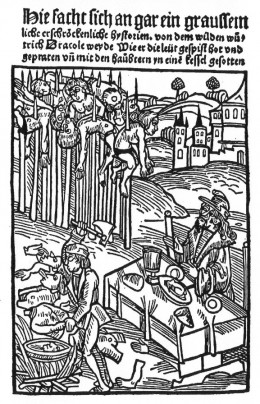Crow, so I'm going to guess that the word "slav" has changed it's meaning from time to time since the 15th century?
not since 15th century. Earlier. Many opened questions on that ethnic name. i am among those who see it as self given name that was later hijacked by the hostile strangers who conquered old Slavs (Sarmatians/Thracians). After they were conquered, their rulers (Romans, Greaks, Teutons) took their name as the synonym for slavery; Slavs = slaves.
In any case its just one of at least three universal names that were/are ethnic designations for one and same people. Before name of `Slaviani` appeared in history, old Slavs (Proto Slavs) were labeled as Sarmatians and Thracians. Then, we know that Scythians were by old authors seen as branch of Sarmatians, as well as Dacians. Dacians were also seen as kin to Thracians. It was not strange/confusing even in the past, considering that obviously, since time immemorial names of Thracians and Sarmatians, as two names for one and same people goes hand in hand and parallel. Then, furthermore, by the western Europeans, old Iliryans were also seen as old Slavs. Also, Celts were/are seen as the branch of Scythians. This again connects name of Gauls to the Sarmatians/Thracians.
So, on the map of ancient Europe we on the first place see Proto Slavs, under different names, as the oldest European culture. But, not only European. Anciants lived on inter-continental level. In one moment on history, one and same people lived from what are today`s British islands, via Eurasia/Siberia, to the Ind river in India.
One thing that still irritates me is the articles on Vlad Tepes that states that he is viewed more positively in Eastern Europe despite the fact that the word "Eastern Europe" is thrown around loosely with no exact definition or boundary.
Vlad was by Slavs seen as someone who resist to the Turkish invasion and germanization. That on the first place.
In the same time, don`t forget that west of Europe often collaborated with Turks on the account of Slavs.
Anyways, judging from peoples responses, I'm going to assume that Vlad was never really seen as a hero or anything in Poland.
i am satisfied that Poland had neutral stance on Vlad. That`s how i see that. Back in those time, Poland was exposed to two main sources of informations. Those were on the first place Serbians, considering that they played role of the military elite in the pre-Commonwealt Poland and during Commonwealth. On the other side, Poland had to cope with the west of Europe due to specific historical circumstances. While Hungarian rulers, under the influence of Germans, sow Vlad exclusively in negative sense, Poland hesitated to see him in negative light.
Also, have in mind that famous Polish King Jan Sobieski acted as Grand master of the Dragon Order- originally founded by the Serbian Voivode Milos Obilic. Same noble order which earlier member was Vlad Tepes, too.
 PolishForums LIVE / Archives [3]
PolishForums LIVE / Archives [3]
